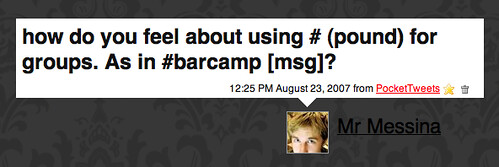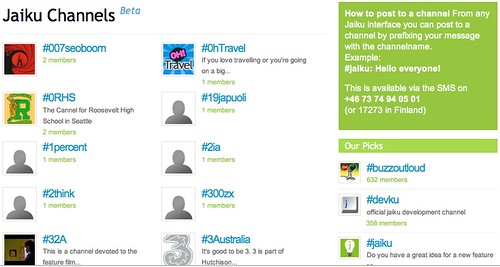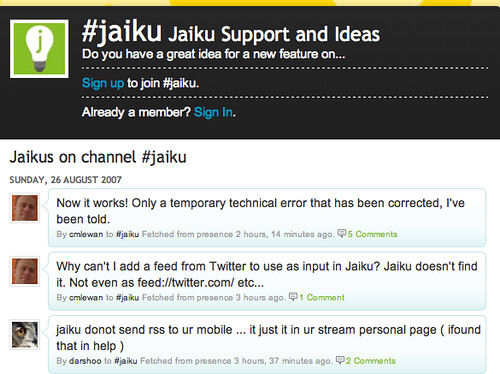Channels Will Improve the Twitter Experience

I've been following Chris Messina's and Stowe Boyd's discussion on creating pseudo channels for Twitter. I find this extremely interesting because the volume of users and tweets are well beyond overwhelming it it makes it difficult to track, discover, and participate in relevant and interesting conversations.

Messina and Boyd aren't talking about groups as we know them in other social networks per se, but more along the lines of parsing information to specific assemblies of people around a common topic. This is sort of along he same track as Channels on Jaiku, but more of a user-driven magnifying glass into conversations specific to communities.


As Chris points out, we should get the vocabulary clear before moving forward with this discussion (cut and paste from Messina's post).
Stephanie Booth:
- “groups” or “shared-interest groups” (”Flickr-groups”)
- “groupings” (”ad hoc assemblages of people with similar interests” — Stowe Boyd)
- “contact groups” (organising my contacts)
Brian Oberkirch:
...we are talking about 3 kinds of groups: public groups you ‘join’ a la FB groups. Ad hoc groups users control whether via grouping management (Pownce) or tagging. And then we have context specific groups based on location (@ South Park, anyone want to walk to Philz?).
Messina calls them channels. Stowe Boyd calls them groupings. Both agree on Hash Tags (#this isahashtagexample). Whatever we call it, Twitter's evolution is rampant and the noise will only increase to a deafening level. The ability to have instant access or simply listen to specific conversations, information or people is critical and an important next step. It's no longer related to answering a specific question, "what are you doing?" The edglings have pushed the applications for Twitter so far forward that Twittersphere aka Twittosphere has outgrown its simplicity.
Messina points out, "...I’ve realized is that this “channel” concept meets many of the aggregate desires expressed in various “Groups for Twitter” discussions while not inheriting a lot of the unnecessary management cruft that most group systems seem to suffer from, it is easily accessible adapting current Twitter syntax and convention, it’s easy to learn and lightweight, it’s very flexible and entirely folksonomic and works with people’s current behaviors, rather than forcing anyone to learn anything radically new."
Boyd observes, "My sense is that tags in Twitter, as elsewhere, define shared experience of some kind, involving all those using the tag. And the use can be either actively putting a hash tag (like "#hashtag") into a tweet, or more passively opting to follow a stream of tweets related to a tagged theme."
If you think about it, even Technorati hasn't truly mastered this art of granting access to themes. Don't get me wrong, today you can track conversations related to key words and tags, but I just feel that much in the same way techmeme tracks certain blogs around particular conversations, Technorati - and Twitter - could provide the ability to do something similar.
And, what if you could pull an OPML file or RSS feed based on these adhoc groups or discussions so that you could be notified with every new update? Well perhaps then Twitter could mature without losing its beloved simplicity.
Stowe also brought up Tagspaces, a term I haven't heard for a while. The intent was to bring a standard to tagging across all online communities that would help people discover others, along with content, without requiring database network-specific "rel" tags. For example, a tag for "twitter" in Technorati, looks something like this: "twitter"
I think back something that Chris Heuer wrote in a post from 2005, "...tagspaces are the glue between people identifying something and those seeking it out..."
Either way, I really think that Chris Messina, Stowe Boyd, and the others that are discussing this in the open will cause change, and it will make Twitter an even more important platform for communication.
On a side note, take a look at Joseph Smarr's interesting post on how the voices of less frequent users are getting drowned out by more active participants.
Connect on Twitter, Jaiku, Pownce or Facebook.
Technorati Tags:
twitter, jaiku, channels, stowe+boyd, chris+messina, chris+heuer, tagspaces, tags, rel, technorati, groups, group, groupings, pr2.0, pr+2.0, media2.0, media+2.0, media, 2.0, social+media, social, socialmedia, channels












2 Comments:
Hey Brian, thanks for writing this up. I think you've captured the sociologically component of this discussion really well. I'm most interested in getting lots of people's feedback on this idea since it seems that, from the conversations I've had with Twitter folks, they're looking at implementing the older, more explicit model of groups that I think would actually encumber the system considerably. In any case, mine is not the only way forward, so I'm eager to see where the conversation goes from here!
Oh, and it wasn't Dave Winer's post in your last paragraph... it was Joseph Smarr's from Plaxo.
Talk about getting lost in the weeds.
Post a Comment
<< Home